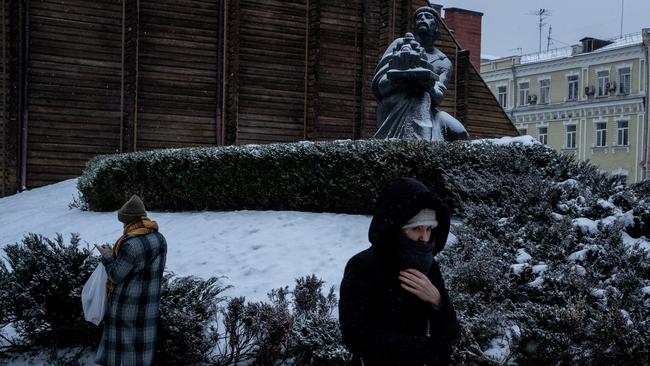Russian President Vladimir Putin sends medical units to Ukrainian front
Moscow has put what appear to be final preparations for an invasion of Ukraine by sending medical units to the front.
Moscow has put what appear to be final preparations for an invasion of Ukraine by sending medical units to the front, moving to a level of readiness that it hadn’t reached in past build-ups.
While the moves don’t mean an attack is certain, they are prerequisites for battle and have intensified debates among Western allies over Russian President Vladimir Putin’s intentions. The US and European allies, particularly Germany and France, appear to be drawing different conclusions from identical intelligence.
The White House said on Thursday (Friday AEST) that German Chancellor Olaf Scholz would make his first official visit on February 7 and listed the situation around Ukraine as the top agenda item.
The Kremlin’s spokesman said there was little optimism in Moscow that the West would accept its demands over de-escalating the standoff over Ukraine, and said Mr Putin would take his time in considering proposals delivered by the US and NATO a day earlier.
The US and NATO allies late Wednesday sent written responses to Moscow over its security demands that would redraw Europe’s security architecture by barring former Soviet states from joining the alliance and hosting US military bases.
While Washington’s proposals expanded on diplomatic efforts to counter fears that Mr Putin is planning an incursion into Russia’s ex-Soviet neighbour, they didn’t address Moscow’s core demands.
“There is not much reason for optimism,” Kremlin spokesman Dmitry Peskov said. “It cannot be said that our considerations were taken into account or that any willingness to take into account our concerns was demonstrated.”
Russia has continued diplomatic talks but also reinforced its troops, which now number more than 100,000 near Ukraine in an unprecedented show of land, air and sea forces.

The Kremlin has used military exercises and manoeuvres as preparations to attack Georgia and Ukraine, but it has also at times moved troops into aggressive positions only to draw them back. Western intelligence analysts and politicians generally agree that Mr Putin is successfully keeping them guessing and on edge, which may be one of his primary objectives.
The US is preparing for a full-scale invasion while also readying for what officials call hybrid attacks – efforts to subvert the Ukrainian state, sabotage, or coercion. As of late Wednesday, US officials hadn’t determined whether or not Mr Putin had decided to invade. Deputy Secretary of State Wendy Sherman said there was every indication he was going to use military force sometime, perhaps by the middle of next month.
US intelligence agencies remain on the hunt for clear indications Mr Putin had abandoned negotiations and given the troops orders that suggested imminent movement. The agencies think Mr Putin is considering whether an invasion would further his overarching objectives, and is gauging the potential impact of threatened sanctions and a US and allied military response. But intelligence officials are aware his calculations are changing constantly.
US preparations are coloured by Washington’s failure to foresee the sudden collapse of the US-backed Afghan government in August as Taliban forces swept forward. The White House wants to avoid another embarrassing spectacle of US unpreparedness, and so has sounded the alarm more than its allies on Russian intentions.
German officials say they think a full-scale attack is less likely than a prolonged hybrid war to weaken the government in Kiev. They worry that what they deem nervous reactions, such as evacuating the families of embassy staff, could drain resources and political will among diplomats in Ukraine to continue pursuing a solution.
“The US thinks Putin will do a full-blown war. Europeans think he’s bluffing,” a senior German official said. “Americans are preparing with the sense that it will happen. We don’t.”
Other German officials said the differences were less stark, saying while Berlin didn’t discount the risks of invasion, Washington seemed more convinced that this was Mr Putin’s plan. “Different shades of grey,” a Berlin-based diplomat said.
Other European countries view the advanced preparations as more likely to be a part of a maximum-pressure campaign by Moscow, likely supplemented by cyber warfare. They see Moscow’s goal as primarily trying to force political changes in Kiev and achieve broader negotiations that could impede Ukraine’s westward tilt.
But there are plenty of exceptions, including in Europe’s east and north. “There is and has been for some time a difference in the sense of urgency,” said a senior Scandinavian diplomat. “But there is no doubt that a number of European countries are more closely in line with the US perception.”
The Wall Street Journal



To join the conversation, please log in. Don't have an account? Register
Join the conversation, you are commenting as Logout